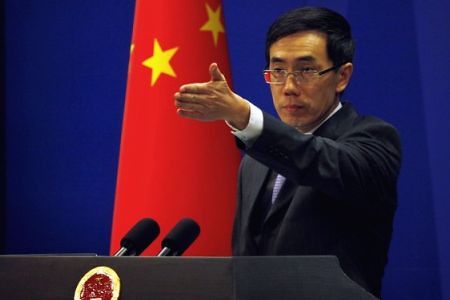China’s behavior in the West Philippine Sea is pushing the region in the wrong direction as Beijing’s overly broad scope and basis of its claims are fostering a climate of anxiety among countries in the region to fortify their own claims, according to a US lawmaker.
Connecticut Sen. Joseph Lieberman expressed concern over China’s behavior in the region, saying the way in which the conflicts there are responded to is a “test” of whether the geopolitics of a rising Asia are going to be defined by win-win cooperation or zero-sum competition.
“The way we handle these conflicts is going to be a test of whether the countries of the region can resolve these differences peacefully according to international law or through coercion and force,” Lieberman said.
Although the US is not a claimant in the disputes in the region, Lieberman said Washington has $1.2 trillion of trade flowing through the waters of the West Philippine Sea (South China Sea) every year.
And because of the long-standing commitment of the US to uphold freedom of navigation and open access to maritime commerce, Lieberman said it has been one of the reasons why the Asia-Pacific region has experienced such explosive and progressive economic growth in the decades since World War II.
“And most important of all, I think, in the larger picture to the United States and the region and the world, the South China Sea really and the conflicts that are ongoing there now are going to provide a special and very important test for China itself, which is to say how will Beijing relate to its neighbors as it grows more powerful, and in a larger sense, what kind of great power will China be in this century,” Lieberman said during the second annual conference on Maritime Security in the South China Sea last Thursday in Washington hosted by the Center for Strategic and International Studies (CSIS).
When China pursues policies in the South China Sea that are heavy-handed or lack a clear basis in international law, Lieberman said, “it naturally creates distrust, increases the danger of miscalculation and leaves China... more isolated in the region and in the world.”
“That’s not an outcome that any of us should want, least of all the United States,” he said.
On the contrary, Lieberman said the US has for decades consistently supported China’s integration into the global economy and the international system.
The US senator described as “unsettling” China’s lack of clarity over the rationale for China’s 9-dash line.
“I believe it is pushing the region in the wrong direction and sending a message that is discouraging about what kind of great power China will be and how it will relate to its closest neighbors,” Lieberman said.
“The overly broad scope, nature and basis of China’s claims are quite naturally fostering a climate of anxiety and driving other parties, most recently Vietnam and the Philippines, to fortify their own claims. It doesn’t need to be this way,” he said.
In April 2011, the Philippines lodged a diplomatic protest against China’s 9-dash line territorial claim over the whole of the West Philippine Sea.
The map is called “9-dash line” or “9-dotted line” because it showed a series of nine dashes or dotted lines forming a ring around the West Philippine Sea, which China claims is part of its territory.
The area includes the Spratlys group, a cluster of oil-rich islands disputed by five other countries, including the Philippines.
China has been using the map with nine dashes in asserting its territorial claim over the whole of the South China Sea. The map first made its way to a United Nations body when China used it to challenge the claim made by Vietnam and Malaysia over their extended continental shelves in the South China Sea.
In the Asia-Pacific region itself, Lieberman noted there are significant and hopeful precedents for peacefully resolving disputes that are not that dissimilar under international law.
He cited the resolution of intense disputes that existed between Malaysia and Singapore, between Malaysia and Indonesia, and between Singapore and Indonesia.
Rather than becoming a combat zone for 19th-century-like competition, Lieberman said the South China Sea should become a model for 21st-century cooperation and mutually beneficial joint development of the enormous natural resources under the sea in a way that benefits the people of the region and the world.
Multilateral context
To do so, however, Lieberman said certain principles are needed to be recognized by all.
With some of the claims of national sovereignty literally overlapping each other, bilateral negotiations simply will not resolve all the outstanding differences, he said.
Only by working together in a multilateral context, and preferably under some third-party mediator or arbitrator, Lieberman said, can the challenges of the South China Sea be addressed in a fair and comprehensive way.
Lieberman noted a first important step would be for the Association of Southeast Asian Nations (ASEAN) and China to move as quickly as possible to agree on a code of conduct for the South China Sea.
All parties need to recognize that disagreements over the South China Sea can only be settled on the basis of international law. Trying to solve these disagreements on the basis of dueling historic claims, by contrast, is a recipe for endless disagreement, continuing tensions and the genuine risk of violence, he said.
“We know from history that territorial disputes usually are very emotional for the people of the countries involved. And precisely for this reason, the countries that are involved in these disputes today need to exercise restraint and moderation,” he added.-The Philippine Star (July 05, 2012 12:00AM)



No comments:
Post a Comment